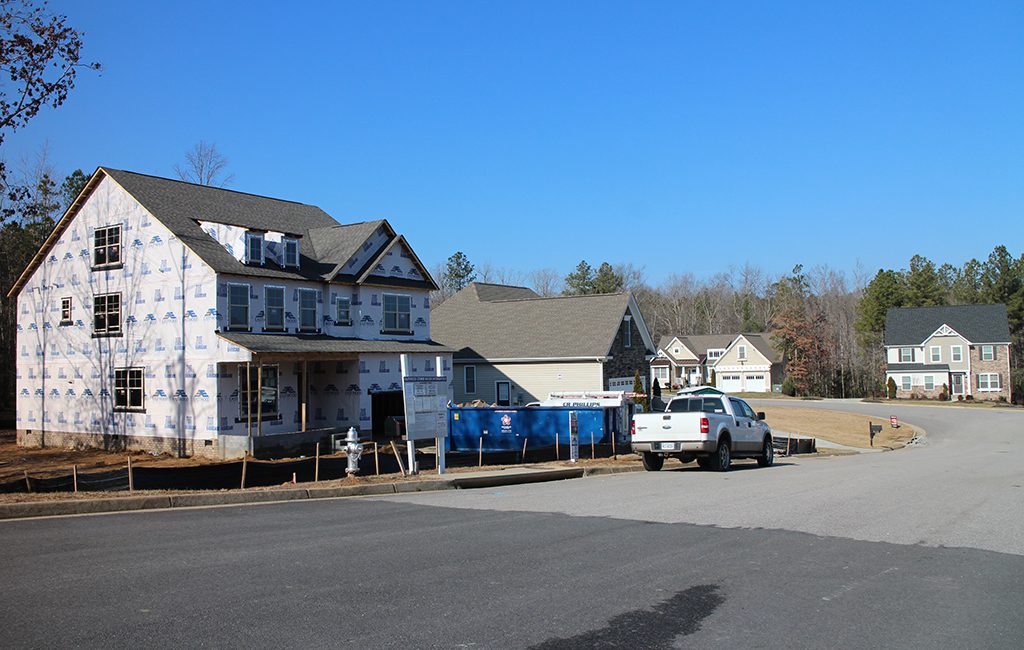
Construction in Harpers Mill, a Chesterfield development active despite the proffers. (Jonathan Spiers)
In what could be the first reduction to its policy in a quarter century, Chesterfield County supervisors are considering a change to the county’s cash proffer system that critics maintain has stymied residential growth.
The board is scheduled to discuss and vote this afternoon on a revised cash proffer policy that would essentially cut in half the amount of money the county requires from developers to offset the impacts of residential developments on public facilities, such as roads and schools.
The new policy would reduce the proffer amount from its current $18,966 maximum to a $9,400 maximum per dwelling unit. It would also make those payments specific to road improvements, meaning schools and other facilities would be funded from other revenue sources.
County Administrator Joseph Casey, who is three months into his job after years in deputy positions with Henrico and Hanover counties, said the proposed changes are aimed in part at encouraging development in areas of the county targeted for revitalization.
“Whether it’s affordable housing or quality housing in certain areas, we’ve almost created an economic impediment to being able to develop housing for revitalized areas or communities because of the cash proffer and the $18,900 amount that it currently is,” he said. “With or without state code changes, the economic model of residential development was being impeded by many things, but foremost, the cash proffer.”
Earlier this year, the General Assembly passed a law prohibiting localities from requesting or accepting “any unreasonable proffer” as a condition of approval of a new residential development. While the county’s policy change would follow suit with that, Casey noted discussions about a possible change have been ongoing since before he joined the county in July.
“This program hopefully positions the county to have a fair and equitable proffer relative to the construction in the area it is,” Casey said, “as well as focus on a zero proffer in areas that are in revitalization and preservation areas that will be defined by the county going forward.”
The reduction would be the first since the county started evaluating zoning cases according to a cash proffer policy in 1989. Since then, what started as payments of a couple thousand dollars steadily increased over the years to its current amount, which has remained unchanged since 2009.
Andrew Clark, government affairs director for the Home Building Association of Richmond, said the group has been lobbying for a change to the policy for years. Clark was involved in negotiations over the past several months that led to the current proposal.
“The proposal before the Board of Supervisors is the result of many months of open dialogue between the industry, the county administration and residents about how we can best position Chesterfield to achieve its short- and long-term economic development and community revitalization goals,” Clark said in an email.
“Chesterfield County is a different place than it was when the policy was first implemented in 1991. I think it’s important to occasionally dust off old policies to see if they will get us where we want to be as a community in five, 10, 20 years.”
Where Chesterfield’s current proffer amount is the highest in metro Richmond, the reduction would bring it below Goochland County’s proffer amount of $13,950 per dwelling. Hanover County charges $2,306, while Powhatan County requires $1,880 per dwelling. Henrico County and the City of Richmond do not charge cash proffers.
Casey – one of several new faces in county leadership, including new members of the board of supervisors, planning commission and school board, as well as a new schools superintendent– said the changes would make proffers a specific funding source for roads and free up the county from relying on them for schools and other facilities that would be funded from other sources.
“If I’m focusing on the road proffers and I can leverage dollar for dollar with revenue-sharing and other types of state grants for road construction, it takes my current local revenue pressure off of trying to maximize such revenue-sharing projects with the state, and I can dedicate those portions of the local revenues freed up towards my capital needs,” Casey said.
He added that funding for schools would be budgeted according to enrollment projections and other revenue sources and available debt capacity, as well as from proffers that are currently outstanding that he said would cover the needs identified in the school system’s current five-year capital improvement plan.
Kevin McNulty, president of LifeStyle Home Builders, which builds homes in Chesterfield and throughout metro Richmond, said the proposed policy change would be welcomed by the industry after months of negotiations and dialogue between stakeholders.
“There have been conversations going on for years around the county about how the cash proffer system was broken and needed to be rethought,” McNulty said. “Since the time of its implementation, the world has changed, the economy has changed, but the cash proffer policy and methodology has not changed.
“There have been conversations for years about the need to reform it, but we never could figure out how to get everybody on the same page with what needed to change,” he said.
McNulty attributed this latest push that led to a formal proposal to the recent additions to county leadership.
“We’ve gotten new thinking that’s come to the table from outside of Chesterfield that hasn’t grown up just assuming that cash proffers should be done the way they’ve always been done,” he said. “They’re bringing other ways and methods and thinking to the table of how we should view development and proffers and zoning.”
McNulty said he welcomes a change to the policy, which he said has been detrimental to doing business in the county – particularly for apartments and condominium developments where the cost per unit adds up more quickly.
“It’s had an impact,” McNulty said. “The cost of the proffer has to go into our cost, and there’s no value added in that cost to the buyer.
“When we pay a cash proffer, it’s money that doesn’t help us make the product any better; it’s just a fee that has to go to the county,” he said. “If we can bring those fees down, we can do other things – reduce prices or change some of the quality features that we’re putting in the home.”
County supervisors are scheduled to vote on the proposal at their regular meeting today. The meeting starts at 3 p.m.

Construction in Harpers Mill, a Chesterfield development active despite the proffers. (Jonathan Spiers)
In what could be the first reduction to its policy in a quarter century, Chesterfield County supervisors are considering a change to the county’s cash proffer system that critics maintain has stymied residential growth.
The board is scheduled to discuss and vote this afternoon on a revised cash proffer policy that would essentially cut in half the amount of money the county requires from developers to offset the impacts of residential developments on public facilities, such as roads and schools.
The new policy would reduce the proffer amount from its current $18,966 maximum to a $9,400 maximum per dwelling unit. It would also make those payments specific to road improvements, meaning schools and other facilities would be funded from other revenue sources.
County Administrator Joseph Casey, who is three months into his job after years in deputy positions with Henrico and Hanover counties, said the proposed changes are aimed in part at encouraging development in areas of the county targeted for revitalization.
“Whether it’s affordable housing or quality housing in certain areas, we’ve almost created an economic impediment to being able to develop housing for revitalized areas or communities because of the cash proffer and the $18,900 amount that it currently is,” he said. “With or without state code changes, the economic model of residential development was being impeded by many things, but foremost, the cash proffer.”
Earlier this year, the General Assembly passed a law prohibiting localities from requesting or accepting “any unreasonable proffer” as a condition of approval of a new residential development. While the county’s policy change would follow suit with that, Casey noted discussions about a possible change have been ongoing since before he joined the county in July.
“This program hopefully positions the county to have a fair and equitable proffer relative to the construction in the area it is,” Casey said, “as well as focus on a zero proffer in areas that are in revitalization and preservation areas that will be defined by the county going forward.”
The reduction would be the first since the county started evaluating zoning cases according to a cash proffer policy in 1989. Since then, what started as payments of a couple thousand dollars steadily increased over the years to its current amount, which has remained unchanged since 2009.
Andrew Clark, government affairs director for the Home Building Association of Richmond, said the group has been lobbying for a change to the policy for years. Clark was involved in negotiations over the past several months that led to the current proposal.
“The proposal before the Board of Supervisors is the result of many months of open dialogue between the industry, the county administration and residents about how we can best position Chesterfield to achieve its short- and long-term economic development and community revitalization goals,” Clark said in an email.
“Chesterfield County is a different place than it was when the policy was first implemented in 1991. I think it’s important to occasionally dust off old policies to see if they will get us where we want to be as a community in five, 10, 20 years.”
Where Chesterfield’s current proffer amount is the highest in metro Richmond, the reduction would bring it below Goochland County’s proffer amount of $13,950 per dwelling. Hanover County charges $2,306, while Powhatan County requires $1,880 per dwelling. Henrico County and the City of Richmond do not charge cash proffers.
Casey – one of several new faces in county leadership, including new members of the board of supervisors, planning commission and school board, as well as a new schools superintendent– said the changes would make proffers a specific funding source for roads and free up the county from relying on them for schools and other facilities that would be funded from other sources.
“If I’m focusing on the road proffers and I can leverage dollar for dollar with revenue-sharing and other types of state grants for road construction, it takes my current local revenue pressure off of trying to maximize such revenue-sharing projects with the state, and I can dedicate those portions of the local revenues freed up towards my capital needs,” Casey said.
He added that funding for schools would be budgeted according to enrollment projections and other revenue sources and available debt capacity, as well as from proffers that are currently outstanding that he said would cover the needs identified in the school system’s current five-year capital improvement plan.
Kevin McNulty, president of LifeStyle Home Builders, which builds homes in Chesterfield and throughout metro Richmond, said the proposed policy change would be welcomed by the industry after months of negotiations and dialogue between stakeholders.
“There have been conversations going on for years around the county about how the cash proffer system was broken and needed to be rethought,” McNulty said. “Since the time of its implementation, the world has changed, the economy has changed, but the cash proffer policy and methodology has not changed.
“There have been conversations for years about the need to reform it, but we never could figure out how to get everybody on the same page with what needed to change,” he said.
McNulty attributed this latest push that led to a formal proposal to the recent additions to county leadership.
“We’ve gotten new thinking that’s come to the table from outside of Chesterfield that hasn’t grown up just assuming that cash proffers should be done the way they’ve always been done,” he said. “They’re bringing other ways and methods and thinking to the table of how we should view development and proffers and zoning.”
McNulty said he welcomes a change to the policy, which he said has been detrimental to doing business in the county – particularly for apartments and condominium developments where the cost per unit adds up more quickly.
“It’s had an impact,” McNulty said. “The cost of the proffer has to go into our cost, and there’s no value added in that cost to the buyer.
“When we pay a cash proffer, it’s money that doesn’t help us make the product any better; it’s just a fee that has to go to the county,” he said. “If we can bring those fees down, we can do other things – reduce prices or change some of the quality features that we’re putting in the home.”
County supervisors are scheduled to vote on the proposal at their regular meeting today. The meeting starts at 3 p.m.





OVERGROWTH! We have too much growth and it needs to slow down to keep up with the aging infrastructure.
We need the current developers/builders to PAY for new schools and fire stations and county infrastructure.
We have unbelievable traffic problems for a medium sized city.
Our metro areas are swamped with vehicles and pollution.
Wake UP PEOPLE!!!
*By the way, where are all the NEW jobs coming from to buy these homes and neighborhoods that keep on coming???
Great article Jonathan. The cash proffer system has been forcing urban sprawl for years, because only buyers in the upper income levels can finance that amount in the purchase of a new home. And those areas are in the outlying, not the infill, spaces of Chesterfield. This could lead to a boom in building affordable housing along Route 10, south of the Chippenham and north of 288, where there is plenty of available land and available capacity in the schools and public infrastructure. Someone is finally seeing the relationship and they should be congratulated. Lets get this done today.
Ditto Bruce. Couldn’t have said it better.
As a local Realtor in Chesterfield, this topic comes up quite often. I am happy to hear of potential improvement in this.